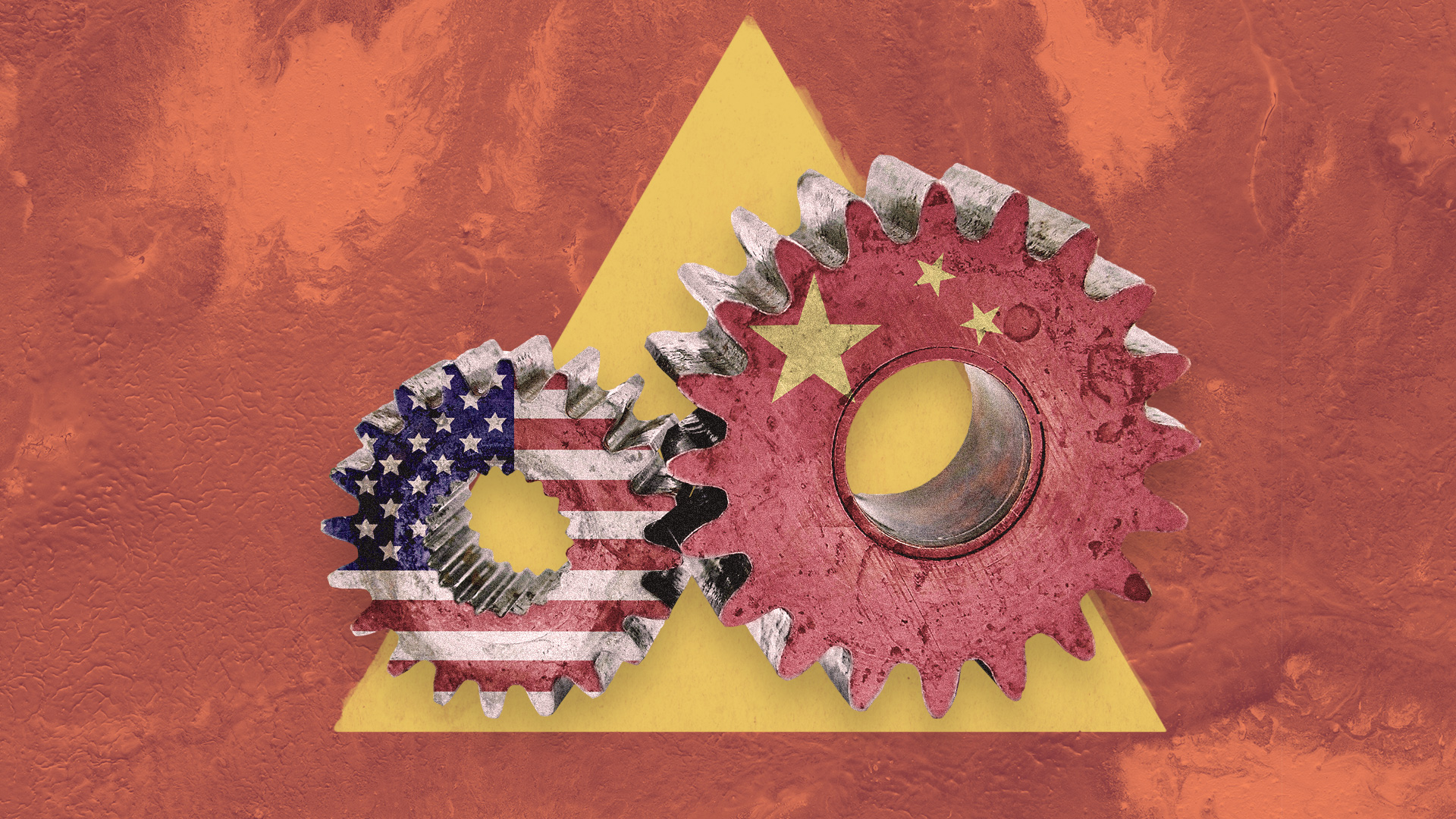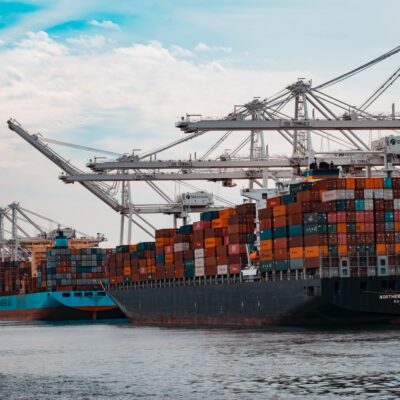

America may no longer be the world’s dominant state, but we must not allow China to claim that title
RECOMMENDED READING
For the last generation, one nation has wielded unmatched military power, bent the international financial system to its will, established almost unilaterally the standards of global communication and infrastructure, and dominated culture and media. For Americans, these seemed good years. And for most others, America’s tutelage was easy, its burden light—certainly compared to history’s other real or aspiring hegemons.
Those days have come to an end. China is the most formidable state Americans have dealt with certainly since the Soviet Union and in some ways since the 19th century. China’s economy is almost as large or perhaps larger than America’s already and, with roughly four times our population and an increasingly educated workforce, its overall (if not per capita) productive capacity should eventually exceed ours by a comfortable margin. By contrast, the Soviet Union, Nazi Germany, Imperial Japan, and Imperial Germany were all considerably smaller economies. China has also proved capable of succeeding in the global economy in a way that the Soviets never would or could. As a result, China has a lot of power to use on—and against—us and the things we care about.
“After decades of foreign policy debates centered on dealing with states and actors far weaker than ourselves, the United States has lost the “finger tip feel” and grammar for determining how to respond to a nation that is comparable to us in power.”
Indeed, recognition that China is a profound challenge is one of the few matters that draws forth near unanimity in American politics. While the Trump Administration was the first to adopt a more realistic and confrontational response to Beijing’s growing power and assertiveness, the Biden Administration has essentially continued its predecessor’s basic line, albeit in different form and fashion and with different areas of focus. The view that China poses a very serious challenge may be one of the few areas of genuine and meaningful bipartisan agreement in the Congress, and polls indicate that the American people themselves increasingly recognize China as a serious and primary threat.
But after decades of foreign policy debates centered on dealing with states and actors far weaker than ourselves, the United States has lost the “finger tip feel” and grammar for determining how to respond to a nation that is comparable to us in power. Why China is such a challenge and what we should try to do in counteracting it remain at best vaguely defined. In point of fact, the answers to these questions are far from obvious. After all, China is far away, as is Asia, where most of Beijing’s influence is currently felt. Meanwhile, America is physically secure, located behind two great oceans and protected by a large military and survivable nuclear arsenal. The chances of China invading and occupying the United States are therefore remote. Further, America is very rich. While our nation has serious problems, including social alienation and inequality, we are in relative terms doing well and our growth prospects emerging from the pandemic appear relatively good.
So, what, then, do we have to worry about? And what should we be trying to achieve?
* * *
In answering these questions in the context of such a powerful challenge, we need to start from first principles. As a republic of free and equal citizens, our interests are: first, our physical security; second, our freedom; and third, our prosperity. The promise of American life, in other words, depends on our being reasonably safe, free, and prosperous. Our interests in confronting China are precisely to protect these, especially our prosperity and, relatedly, our freedom.
It is of critical importance to our prosperity and ultimately our freedom that no state dominate one of the key market areas of the world. This sounds abstract and detached but, if allowed to happen, would be very real in its implications for Americans. A state that could exercise sway over a very large portion of the global economy could and almost certainly would use that enormous leverage to shape—really even determine—international economic flows, regulations, and trade to its benefit. Over time, this would make us increasingly dependent upon a foreign power and weaken our companies, our workers, and our economy.
The most plausible and consequential threat of that coming to pass is China’s attainment of hegemony over Asia. Asia comprises roughly half of the global market, and that share is rising. China constitutes roughly half of Asia’s GDP. If Beijing exercises control over Asia’s huge and growing market area, its influence will ultimately be dominant worldwide as well, giving it the market, scale, and regulatory power to define the world’s future. Building upon such economic advantages, it could intrude into and shape our national life, using its position to coerce, bribe, and cajole companies, individuals, and governments to do its will, diminishing our economic vitality and, through that, our freedoms.
“If Beijing exercises control over Asia’s huge and growing market area, its influence will ultimately be dominant worldwide as well, giving it the market, scale, and regulatory power to define the world’s future.”
We already see this happening around the world, as China brings its immense economic power to bear. The most famous example is the Belt and Road Initiative, a massive network of Chinese investments designed to net China closely with the countries of Eurasia through overland and maritime links, as well as the financial links that accompany those investments. This is giving China more leverage throughout the region, leverage it has increasingly put to use. To take just one example: When Sri Lanka failed to pay its heavy Belt and Road debts, China extracted a 99-year lease to a key port in the island country.
But China is not just picking on the small fry; rather, it is using its growing economic leverage to seek to coerce more advanced economies as well. For instance, it is currently trying to use its status as a major importer from Australia to compel that nation to submit to 14 searching and even humiliating demands, including changes to Australia’s domestic legislation and dampening of media coverage that is critical of China. The proximate cause of Beijing’s pressure is that Canberra had the audacity to call for an independent investigation of the origins of the COVID-19 virus. Beijing has also sought to its economic heft to coerce South Korea over missile defense deployments and Japan over territorial disputes in the East China Sea.
There is little reason to think that the United States would be spared such manipulation if China had the power to effect it. Indeed, we have already seen Chinese economic leverage marshalled against major American brands like Disney, the NBA, and Marriott—sadly, with some success. Even cage fighter John Cena, concerned for his movie’s success in China, was reduced to apologizing for inadequately toeing Beijing’s line on Taiwan.
This is just a taste of what China will do if it attains a hegemonic position over Asia. First and foremost, such a China would reshape international economic flows, regulation, and trade in its favor and to its preferences. This is a natural instinct of dominant states, as it provides great benefits on multiple levels. It allows the dominant state to ensure that the most lucrative and beneficial forms of economic activity cluster within and for itself rather than for others and somewhere else. It generates scale, enabling firms to gain advantages and compete more efficiently, thereby becoming more productive and dominant and making their investors, officers, and employees wealthier and more secure.
Think how the American-born internet supported Silicon Valley, and vice versa, leading to a World Wide Web governed by formal laws and informal norms almost entirely of American design. Think how the desire for access to American capital markets gives American regulators de facto control over global accounting standards, or how the need to transact with American institutions allows U.S. Treasury officials to freeze the assets of designated targets anywhere in the world. Think how Americans take for granted that English is the universal language and that everyone accepts dollars. Think how the American university degree has become the preeminent global academic credential, with searching implications for everything from global educational standards to measures of professional success.
“We have already seen Chinese economic leverage marshalled against major American brands like Disney, the NBA, and Marriott—sadly, with some success. Even cage fighter John Cena, concerned for his movie’s success in China, was reduced to apologizing for inadequately toeing Beijing’s line on Taiwan.”
Now think instead of the yuan as the reserve currency of the globe and the dollar supplanted, with China rather than the United States enjoying that “exorbitant privilege.” China’s central bank, not America’s, would set the global economy’s tempo. Think of China’s sanctions power equaling America’s today. Think of China dominating fractious and economically anemic Europe as well, with Beijing acting as gatekeeper and term-setter for access to the enormous market of Asian consumers. Standing alone in comparison to such a dominant China, America would no longer be the decisionmaker; it would have to conform to China’s preferences.
And forget lobbying Congress to change how social media companies are regulated; Americans would have to petition Chinese officials and regulators, with far less chance of accountability, let alone hope of success. Today’s internet has been decisively shaped by the United States, with its strong preference for open and broadly “liberal” ideas. Europe, meanwhile, focuses on privacy protections. Yet the People’s Republic of China values neither. Beijing represses speech on its own internet and allows little if any privacy protection. If China set the rules of the internet, Beijing would naturally tend to shape them in such directions. The same would go for everything from surveillance to speech controls to banking. It already uses technology, including facial recognition, big data, and artificial intelligence to impose and police so-called “social capital” scores for its own citizens. Why would famously nationalistic China treat foreigners more leniently?
“China could insist on labor, information, regulatory, environmental, and legal changes that decisively shaped Americans’ lives. The professional and probably much of the personal lives of Americans would be shaped—if not determined—by Chinese leaders.”
Instead of being the world’s great large economy, the pinnacle of mass prosperity, and the master of its own fate, America would become something much less. We would likely remain more prosperous than many countries, but we would live under China’s economic shadow. Chinese companies would gobble up or render dependent American—and European, Japanese, and South Korean—companies, leaving America’s economic fortunes to be decided upon in China. China could insist on labor, information, regulatory, environmental, and legal changes that decisively shaped Americans’ lives. The professional and probably much of the personal lives of Americans would be shaped—if not determined—by Chinese leaders.
Importantly, China need not create a great territorial empire to achieve this position of hegemony over Asia and, from there, a predominant global position. Rather, it simply needs to exert enough influence over the countries of the region with respect to their important economic and strategic decisions. A hegemonic China would not directly rule over countries within its sphere, but those countries would follow Beijing’s line on key economic, political, and military matters—or else. In practice, such subordinated states would orient their trade, economic, and regulatory policies to China’s demands, and avoid provoking Beijing by making or sustaining alliances or independent trading relationships with rivaling states—above all the United States.
* * *
How do we head off this outcome? Let’s first be clear about what we don’t need. We don’t need China to fundamentally change its internal system. We don’t need to dismember it. We don’t need it to bend the knee to us. We don’t need to establish our own hegemony over Asia. Such delusions led us to the sorry impasse in which we now find ourselves. What we do need is disciplined focus on what our enlightened interests specifically require.
Our goal should be a favorable, stable, and enduring balance of power with China. We want—in coalition with other states that share our interests—to agglomerate enough power that we can prevent China from undermining our prosperity and the liberty it enables. We want to reach a point at which we—along with our allies and partners in this balancing coalition—are strong enough that China, recognizing the futility of attempting serious coercion or violence against us, must respect our interests. Once we have attained such a position of strength, we can pursue détente with Beijing, but not before.
As a basic yardstick, we need a balancing coalition that is larger in GDP terms than China and its allies, probably by a decent measure given that China is a unitary giant of a state and thus can act more cohesively than a large coalition. That standard is a bit crude, but it captures the core idea: an effective balancing coalition needs to be a group of states whose “hard” economic and military power is greater with respect to the theater of focus than that of China’s own group. Think primarily of the United States, Japan, India, Australia, South Korea, Taiwan, some South and Southeast Asian states, and, less directly, some states from outside Asia. Europe can help, primarily by contributing economic scale and by taking care of its own security and that of its immediate neighborhood. But the core of this coalition will be in Asia.
“Our goal should be a favorable, stable, and enduring balance of power with China. We want—in coalition with other states that share our interests—to agglomerate enough power that we can prevent China from undermining our prosperity and the liberty it enables.”
If we can assemble and sustain such a group, we can blunt China’s aspirations to dominance. If Beijing tries economic coercion, our coalition will be able to make up losses by deeper economic connections amongst ourselves. If Beijing tries military force, our combined military power will be able to effectively defend the states China targets.
This standard achieved, Beijing will have to respect our interests, but it will still have immense power and a leading place in the international system, something in which the Chinese can take enormous pride. The downside is that China will remain a formidable threat. But the upside of drawing the limits of our strategy here outweigh this downside.
First, we can live with that China. We don’t need anything else from China for our security, freedom, and prosperity. We will retain plenty of market scale within our coalition and in the wide swath of countries likely to avoid affiliating with either us or Beijing.
Second, this standard will not require that we do anything to China. We won’t have to transform its government, dismember its territory, or establish our hegemony over it. This is critical because it will give China a compelling incentive for restraint—in other words, for Beijing to accept a stable balance, sufficiently content that the arrangement provides it enough security, dignity, and prosperity. We will need to confront China and push it hard to uphold the balancing coalition, but China will in any plausible future be hugely powerful, with a range of ways of gravely hurting us, from economic leverage through conventional military force all the way to a growing nuclear arsenal. We don’t want to push China so far into a corner that it judges lashing out too much with these instruments to be the best course.
By contrast, alternative strategies that insist we must democratize China or fundamentally weaken or collapse it would provoke far more cost and risk for Americans than is worthwhile. We might be better off with a democratic China—although that is not a given—just as we might be better off if we remained the only superpower. But thoroughgoing pursuit of those goals would trigger China to take drastic measures, with consequences far graver than the stakes are worth for us.
“Alternative strategies that insist we must democratize China or fundamentally weaken or collapse it would provoke far more cost and risk for Americans than is worthwhile.”
This doesn’t mean we should oppose a democratic China or swear off undermining the People’s Republic. To the contrary, we can and should support democratic government in China. Indeed, it already exists among the Chinese on Taiwan. And we will need to take steps to weaken China’s economic and military power to secure ourselves and our coalition partners. But we should only insist on these measures as needed to attain that favorable, stable, and enduring balance of power in Asia. We may hope for beyond that—for a free mainland China, for instance—but we should not force the issue.
* * *
It is important to underline, though, that the situation is urgent, because the key to preventing China’s attainment of regional hegemony over Asia is acting now. We need to blunt Beijing’s ambitions presently in Asia, rather than deferring the problem. The Pacific Ocean is huge, but consulting the map reminds us that most of it is empty. Outside the United States itself, the vast majority of the Pacific’s economic activity clusters on its western shores—Japan, South Korea, China itself, Southeast Asia. If we wait to meet China halfway it will already have subordinated this huge economic area, essentially winning before the struggle has even started.
The problem this creates is that we must muster resolve to stand up—and, if necessary, fight—for very distant stakes, 10,000 miles from our homeland. And it is even more acute because Beijing’s incentive is to pursue a classic “divide and conquer” strategy. Rather than precipitate a large struggle or war with a consolidated coalition, Beijing’s incentive is to pick any such balancing coalition apart, selectively pressuring or attacking vulnerable members, positioning each effort as not justifying a robust enough American response. The most pressing threat is to Taiwan, on which China has focused its military efforts for a generation while we have been distracted in the Middle East.[inlineref id=1][/inlineref] This is the very real and painful quandary we face.
Part of the solution is preparing the right kind of defense: economic resilience so countries can resist Beijing’s economic coercion, and military defenses that defeat China’s ability to subordinate targeted countries, including Taiwan, while minimizing the costs and risks to ourselves. But equally crucial is for Americans to understand why this is worthwhile, which in turn will harden our resolve for such a contest. And this, in turn, will be the best deterrent to Beijing precipitating such a conflict, as it will see that we and our partners in this balancing coalition have both the way and the will to defeat any such attempt.
It’s one thing to say we are in serious, long-term competition with China. It’s quite another to follow through on such a policy. Americans must wrestle with why we are confronting China and what our goal in doing so is. Too much of our national discussion now about competing with China is disconnected, abstract, and hortatory. It needs to be much more concrete and connected to Americans’ interests, and in any event focused and candid. Failing here risks a fundamental breakdown in the event we are put to the test with China. And that moment may arrive, and may arrive soon.
Recommended Reading
New Survey Shows American Rejection of Globalization
Economists and policymakers out of touch with what people value and why
The American Rejection of Globalization
While many economists continue to insist that globalization has benefited the United States, the American people do not agree.
Policy Brief: The Market Access Charge
Make American goods more attractive to foreigners than American assets












